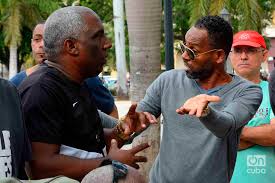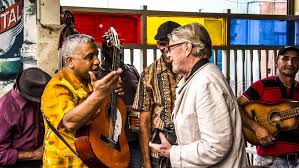 COMO IDENTIFICAR A UN CUBANO EN CUALQUIER LUGAR DONDE SE ENCUENTRE.
COMO IDENTIFICAR A UN CUBANO EN CUALQUIER LUGAR DONDE SE ENCUENTRE.
Se dice que una de las formas de identificar a un cubano, hállese donde se halle, es por lo que come. Preferirá siempre una ración abundante de arroz, un guiso para mojarlo, alguna carne frita y, desde luego, el postre imprescindible porque si no remata la cena con algo dulce, siente que no ha comido.
Otra forma de identificarlo es la de reparar en la forma en que conversa.
Habla por lo general muy alto y acompaña sus palabras con gestos fuertes y reiterados, al punto de que quien los observa, de desconocer esa particularidad, podría llegar a pensar que está en presencia de personas que discuten y que en algún momento llegarán a las manos cuando, en verdad, sostienen una conversación amistosa. * Dos vecinas pueden airear sus intimidades de balcón a balcón o de acera a acera con la mayor tranquilidad del mundo y un diálogo entre dos llega a convertirse casi en una charla para toda una multitud porque el cubano es así. Magnifica cuanto hace.
Si está contento, si puede vanagloriarse de algún logro, por ínfimo y efímero que sea, procura que todos lo sepan y compartan su entusiasmo, y si está triste, no oculta su pena, sino que la proclama. Y La Habana no es solo abigarrada y de un barroquismo viviente y generalizado. Es también parlanchina y uno percibe sus voces y sus ecos. La Habana siempre ha sido, como diría Alejo Carpentier, una ciudad sonante. El tañer de las campanas de las iglesias a cada hora del día y de la noche, el pregón de los vendedores callejeros, la música que brotaba de bailes improvisados por cualquier motivo, impresionaron notablemente a viajeros que, en siglos pasados, dejaron memorias de su estancia en Cuba. Y Federico García Lorca vio en 1930 a la capital cubana como una ciudad con mucho calor y gente que habla muy alto.
Hay varios tipos de conversadores. Los que nacieron para la polémica y les basta que alguien a su alrededor diga “rojo” para que ellos respondan que “verde”. * El que echa sapos y culebras por la boca cuando se refiere al prójimo ausente y quiere hacer creer que es incapaz de murmurar sobre alguien a sus espaldas. * El dueño de la verdad infalible. El que pone la nota trágica. Los que traen “la última”, aunque sea mentira. El que parece estar a punto de decir algo trascendental y, al final, no dice nada. Los que después de que todo está dicho, tienen aún algo que decir y terminan repitiendo lo que ya se dijo.
De todos ellos, el peor es el lluvioso. Hay que valerse de un paraguas para evitar ser salpicados por su saliva. Pero si ellos no existieran, los parques,las barberías, los cafés y los bares perderían en mucho su razón de existir. No hay lugar como el bar para las confesiones. Los devaneos de la esposa, el entusiasmo por la chiquilla de enfrente, la mala cabeza de los hijos, los problemas laborales terminan revelándose en la cantina como ante el confesionario. Siempre hay alguien dispuesto a escucharlos y si se hace el bobo, carga con la cuenta.
No hay como darse una vuelta por el Parque Central habanero.
Decenas de personas se dan allí cita espontánea para discurrir sobre los pormenores de la serie nacional de béisbol, el deporte nacional. No dialogan, rugen. Varios de ellos gritan para poder imponerse sobre otros que a su vez hacen lo mismo. Enfatizan sus palabras con la mano. La acompañan con la fuerza de la mirada. La cabeza se mueve, ora despectiva, ora, altanera. Parecen que van a agredirse. Dirimen la conveniencia de una jugada, lo oportuno o inoportuno de la decisión del mentor de un equipo, si el tiro a tercera fue out o una “cuchilla” del árbitro, si la sustitución de tal o más cual jugador a finales del juego fue razonable o no lo fue. Nadie da su brazo a torcer. Ni admitirá estar equivocado.
Cuando más, abandonará el campo al contrario, no porque se haya convencido de la verdad del otro, sino para perdonarle la vida porque al cubano le es más fácil ser condescendiente que justo. Al final, la sangre nunca llegará al río y cada cual se irá por donde vino para reencontrarse con energías renovadas en el mismo sitio al día siguiente.
 HOW TO IDENTIFY A CUBAN IN ANY PLACE WHERE HE IS.
HOW TO IDENTIFY A CUBAN IN ANY PLACE WHERE HE IS.
It is said that one of the ways to identify a Cuban, wherever he is, is by what he eats. He will always prefer a generous portion of rice, a stew to dunk it, some fried meat and, of course, the essential dessert because if he does not finish the dinner with something sweet, he feels that he has not eaten.
Another way to identify him is to notice the way he talks.
He generally speaks very loudly and accompanies his words with strong and repeated gestures, to the point that whoever observes them, if they are unaware of this particularity, might come to think that they are in the presence of people who argue and that at some point they will come to blows when, indeed, they have a friendly conversation. * Two neighbors can air their privacy from balcony to balcony or from sidewalk to sidewalk with the greatest tranquility in the world and a dialogue between two becomes almost a talk for a whole crowd because Cubans are like that. It magnifies how much it does.
If he is happy, if he can boast of some achievement, however small and ephemeral, he makes sure that everyone knows it and shares his enthusiasm, and if he is sad, he does not hide his sorrow but proclaims it. And Havana is not only a motley and lively and generalized baroque. He is also talkative and you can hear his voices and their echoes. Havana has always been, as Alejo Carpentier would say, a dreamy city. The ringing of church bells at every hour of the day and night, the proclamation of street vendors, the music that gushed out from improvised dances for any reason, notably impressed travelers who, in centuries past, left memories of their stay in Cuba. And Federico García Lorca saw the Cuban capital in 1930 as a city with a lot of heat and people who speak very loudly.
There are several types of talkers. Those who were born for controversy and it is enough for someone around them to say “red” for them to answer “green.” * He who throws toads and snakes out of his mouth when he refers to his absent neighbor and wants to make believe that he is incapable of murmuring about someone behind his back. * The owner of the infallible truth. The one who puts the tragic note. Those who bring “the last”, even if it is a lie. The one who seems to be about to say something momentous and, in the end, says nothing. Those who, after everything is said, still have something to say and end up repeating what has already been saying.
Of all of them, the worst is the rainy one. You have to use an umbrella to avoid being splashed by their saliva. But if they did not exist, parks, barbershops, cafes, and bars would greatly lose their reason for existing. There is no place like the bar for confessions. The wives’ ramblings, the enthusiasm for the girl across the street, the children’s bad heads, the work problems end up revealing themselves in the canteen as well as in the confessional. There is always someone willing to listen to them and if he plays dumb, he takes the bill.
There is no way to go around Havana’s Central Park.
Dozens of people meet there spontaneously to discuss the details of the national series of baseball, the national sport. They do not dialogue, they roar. Several of them shout in order to impose themselves on others who in turn do the same. They emphasize their words with their hand. They accompany her with the force of their gaze. The head moves, now contemptuous, now haughty. They seem like they are going to attack each other. Determine the convenience of a play, the timing or the inappropriateness of the decision of a team’s mentor, whether the shot to third was out or a “knife” from the referee, whether the substitution of this or more which player at the end of the game was reasonable or it wasn’t. Nobody gives his arm to twist. Nor will he admit to being wrong.
At the most, he will abandon the field on the contrary, not because he has convinced himself of the other’s truth, but to spare his life because it is easier for the Cuban to be condescending than fair. In the end, the blood will never reach the river and each one will go the way they came to meet up with renewed energy in the same place the next day.
Agencies/ Wiki/ Ciro Bianchi/ Extractos/ Excerpts/ Internet Photos/ Arnoldo Varona/ www.TheCubanHistory.com
THE CUBAN HISTORY, HOLLYWOOD.



 COMO IDENTIFICAR a un Cubano, en Cualquier Lugar Donde se Encuentre.
COMO IDENTIFICAR a un Cubano, en Cualquier Lugar Donde se Encuentre.




